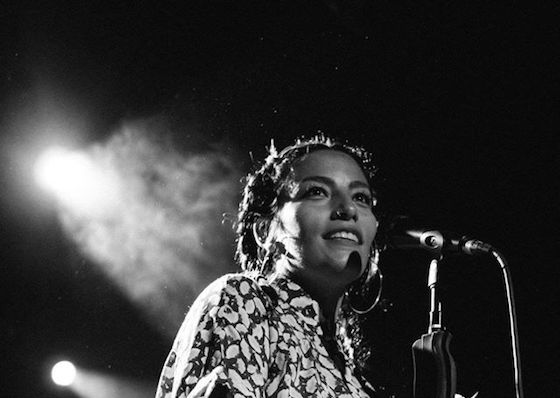There was a time in Latin America when you could not talk to artists without talking about politics. Chile was at the cradle of that movement: from Victor Jara to Third Cinema, whether musicians or directors, Chilean artists could not conceive of art without political commitment; shying away from responsibilities was a way of not making ‘art.’
That’s what I was thinking when I call Chilean-French singer Ana Tijoux. Tijoux’s musical style is probably best defined as electronic hip hop, but it is blended with Latin rhythms, as well as rock, R&B, dancehall, jazz. Add to that the artist’s sweet, melodic voice and potent lyrics and you get the perfect mix that has catapulted her to fame beyond the Spanish speaking world.
When Ana connects via Zoom from home, it is a sunny morning in Santiago, and her flurry of words interrupt my plans to control the interview. “Did you hear what just happened?… only five minutes ago the [Chilean) Interior was shot when she was trying to visit a Mapuche community in the Araucanía region. We believe a tough time is coming to Chile…”
While recalculating, I explain that part of my plan was to ask about her feelings regarding the massive street protests that erupted in Chile in October 2019, the crackdown and (consequent) recent election of Chile’s young leftist President Gabriel Boric who took over on 11 March, and for whom she campaigned. So here we are. Ana continues…
“Chile is now in a new process, with a young government that is only now taking over and a lot of people supporting and keeping attentive to what might happen. There is collective hope: people expect structural changes they protested for and led to the revolts. But it’s not going to be easy. Some of us are critical too, not with this new government, it’s just that they will face an oligarchy, the extreme right and a business class who are going to fight back. That’s why I think tough times are coming. We’re living through a very complex situation here in Chile.”
One cannot help think of the parallels with the democratically-elected Socialist government back in 1970, when President Salvador Allende tried to fulfil voters’ expectations whilst holding off pressure from the far-right elite. With the Americans actively aiding chaos, it was a losing battle which ended up in General Pinochet’s military coup and a 30-year-long dictatorship.
Tijoux often admits to being pessimistic, and yet, like most humans, she can’t help but hope for change. I ask how she feels regarding the situation in Europe with Ukraine.
“We’ve just come out of a pandemic and into a new war. Let’s not delude ourselves that we’ve been living in a war-free world; not if you ask children in Yemen or Gaza or a lot of other places. But now war is moving at a brutal pace and it’s hard to keep a critical view on all that is going on. The problem for me is that it’s never the powerful who pay the price. I would like to tell you I’m surprised about what is going on. But I am not – nothing surprises me. I’m optimistic sometimes but other times my pessimism is brutal. Besides all the death and destruction this war is bringing to Ukraine, there is also the hunger it will produce elsewhere. What can I say, it’s shaky, brother, and I think it won’t stop here…and not to mention we are also in a climate crisis… I would like to say more positive things!” (laughs)
Born in Lille (France) in 1977 from Chilean parents exiled during the Pinochet dictatorship, Ana visited Chile in 1983 for the first time as a kid, but it was not until her teenage years that she settled there in 1993. Two years later she was making rap and was part of the Santiago circuit through bands such as Makiza (1997-2006) which made a name thanks to, in part, Tijoux’s socially relevant lyrics. Her cover of ‘Santiago penando está’ for the album Después de vivir un siglo (2001), a tribute to Chilean cantautora Violeta Parra, led to collaborations with artists such as Mexican singer Julieta Venegas in ‘Lo que tú me das’ (What You Give Me, 2003).
Tijoux’s solo career began in 2007 with the release of Kaos, the album that allowed her to break from the Makiza sound and experiment with soul, funk, jazz and pop. Two years later, she released 1977 a reflective, almost autobiographical album that established the place from which she would speak. The album won her a Grammy nomination and the label ‘South America’s Lauryn Hill.’ The song ‘1977’ caught the attention of Radiohead’s leader Thom Yorke and went viral.
In 2011 came the release of La bala (The Bullet) with songs like 'Shock', inspired by Naomi Klein's documentary and book, and Sacar la voz, a homage to those who fight against injustice and oppression. Tijoux’s 2014 Vengo, her last album so far, has some precious gems, from Mi verdad (My Truth), which talks about inequality, poverty and dignity and Antipatriarca - a feminist song condemning current patriarchal culture and gender violence;
I can be your sister, your daughter, Tamara, Pamela o Valentina,
Your friend, even your life partner,
But I won't be the one who obeys, because my body belongs to me,
I decide in my time how I want and what I want...
That year Tijoux won a Latin Grammy with Jorge Drexler for Universos paralelos and her collaboration in the song Somos Sur (We Are South) with Palestinian-British artist Shadia Mansour opened new doors for work with musicians based in the UK.
“Thanks to Shadia I met the Iraqi singer Lowkey, who is amazing. I will be recording with him so I’m so looking forward to it! I have also worked with the Asian Dub Foundation and with Quantic. I’d love to spend more time working with UK musicians.”
Tijoux is currently working on her new album, the first since Vengo in 2014. During the past two years of social revolts in Chile and lockdown, Tijoux released a few singles which anticipate the direction of her new album; Cacerolazo (pot-banging out of windows, an time-old Latin American protest strategy), Rebelión de octubre (October Rebellion), Antifa Dance, Pa Que (What For?) and the previously released No estamos solas (We Are Not Alone) - a declaration against how Chilean institutions address women.
Ana has always had the ability to create beautiful and meaningful lyrics that resonate with wide audiences, but “right now I’m finding it difficult to write,” she confesses.
“I’m trying but it’s hard because of all we’ve just spoken of. When violence is very much at the forefront, it’s hard to make music. And it’s not just making music; sometimes I feel like I don’t understand the industry, everything needs to be ‘now’ and I feel very slow (laughs). I’m a bit more inspired in these past few days, finally putting into writing a few concerns and a lot of questions. You have to battle through it and keep going.”
She emphasises the importance of collaboration in her creative process: “I rely a lot on others. Without the feedback from my great colleagues I feel very desolated. I tend to ‘vommit,’ get it all out. But I usually need somebody to help me out…”
One guesses that key to Ana’s success has been in her ability to attract these collaborations from a wide range of world class artists, from Jorge Drexler and Asian Dub Foundation to Julieta Venegas or Shadia Mansour – all of whom obviously think a lot of her.
“I discover step by step where an album is going, it is never a linear process where I decide beforehand. The songs take me there,” she explains.
Tijoux songs are diverse, at times more orchestral, at others traditional, using instruments like quenas and charangos. But ultimately her writing style, political positioning and melodic voice lends them all a recognisable common thread. She embodies a curious mixture of ever-searching, perhaps a result of being brought up in exile, with a firmness of spirit that acts as a springboard for whatever she does. Often, Latin American pop artists have looked to Europe or America for influences, in Ana’s case it is her own continent that draws her, is the constant pull.
“There are the classics I always return to, from Michi Sarmiento to Joe Arroyo or Totó La Momposina in Colombia, or Atahualpa Yupanqui and Luis Alberto Spinetta in Argentina, or Daniel Viglietti from Uruguay and Quilapayún, Violeta (Parra) and Víctor (Jara) from Chile. I could go on. I make a potpourri all the time with our classics and the new music that I love. And I love Natalia Lafourcade. I admire her work and the path she’s taken. Among the younger musicians I like Ca7riel from Argentina, such a good musician. There is a wonderful music scene going on now in Latin America, there is a lot going on!”
It’s hard to think that this young rebel spirit is now a mother of two, something she doesn’t like to speak a lot about in public. I can’t help but wonder what impact motherhood has had on her work.
“Yes, you’re right, I don’t speak about my children. Having a public life can be difficult. Maternity is part of me and it comes from my guts, it’s something difficult to define, like an implosion of love, but it is also something very private. Obviously, it’s hard doing my work and also being a mother, but it is no different from what other women do – doctors working in A&E or flight attendants travelling all the time – we all face similar difficulties and try to find those spaces that allow us to be both. Like all mothers, I do lots of juggling. It’s a movement that is not sexy, but I do a job I love and I’m happy to go to the calendar and make both roles work, like my mom did with me.”
And now, the grown-up rebel comes to the UK once again. What will she bring this time?
“We’ll be coming as a quartet with Gloria Maurel on drums, Emilio Martín on bass and Tomás Fosch on keyboards. We’ll have my songs and some others…old songs, new ones and improvise, that’s what I love to do in live shows. I don’t like to do always the same thing because I get bored, so all my shows are different. We’ll let the music take us where we must be.”
Ana Tijoux is playing at The Jazz Café on Tuesday 26 April as part of La Linea Festival
















